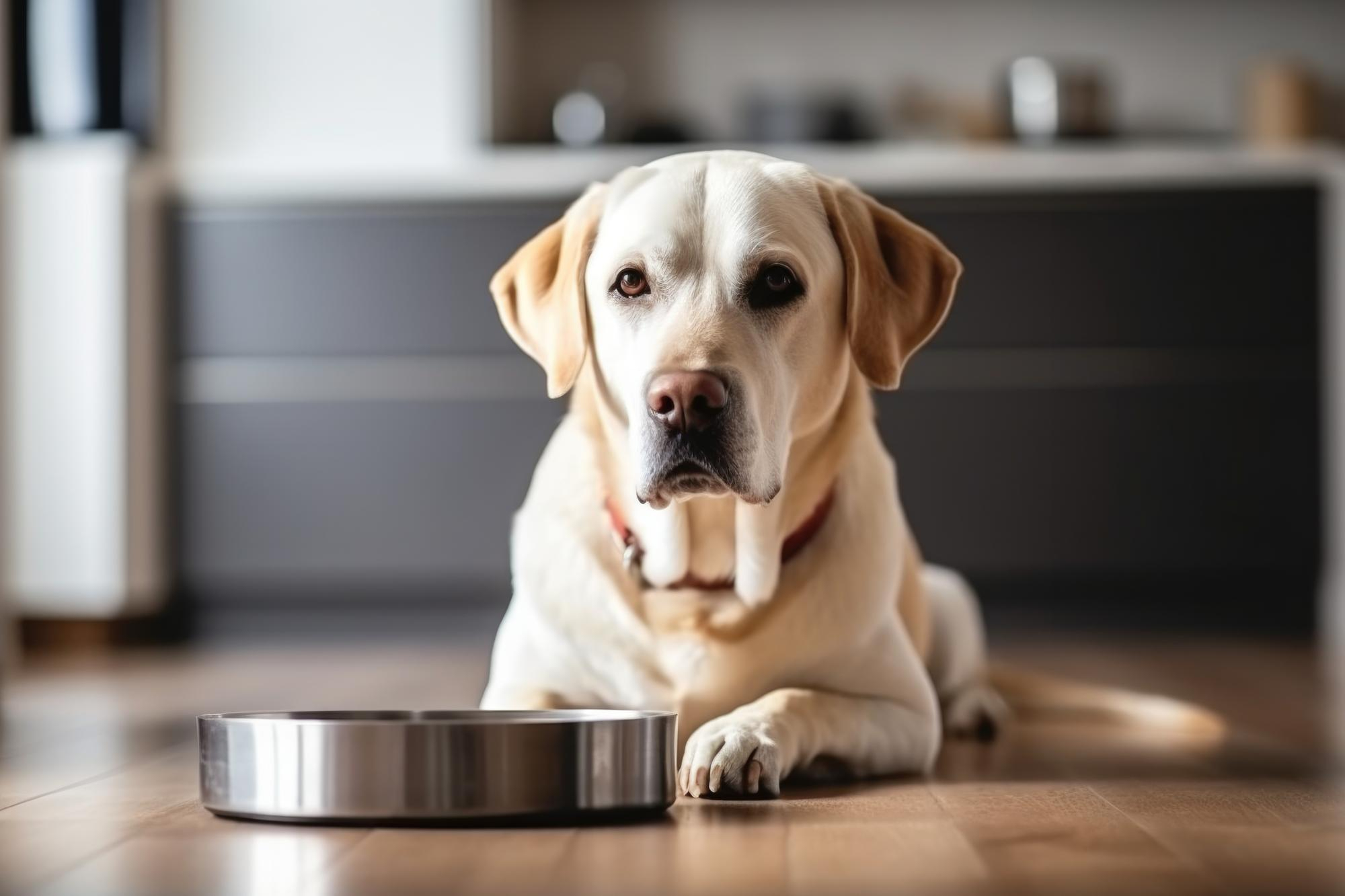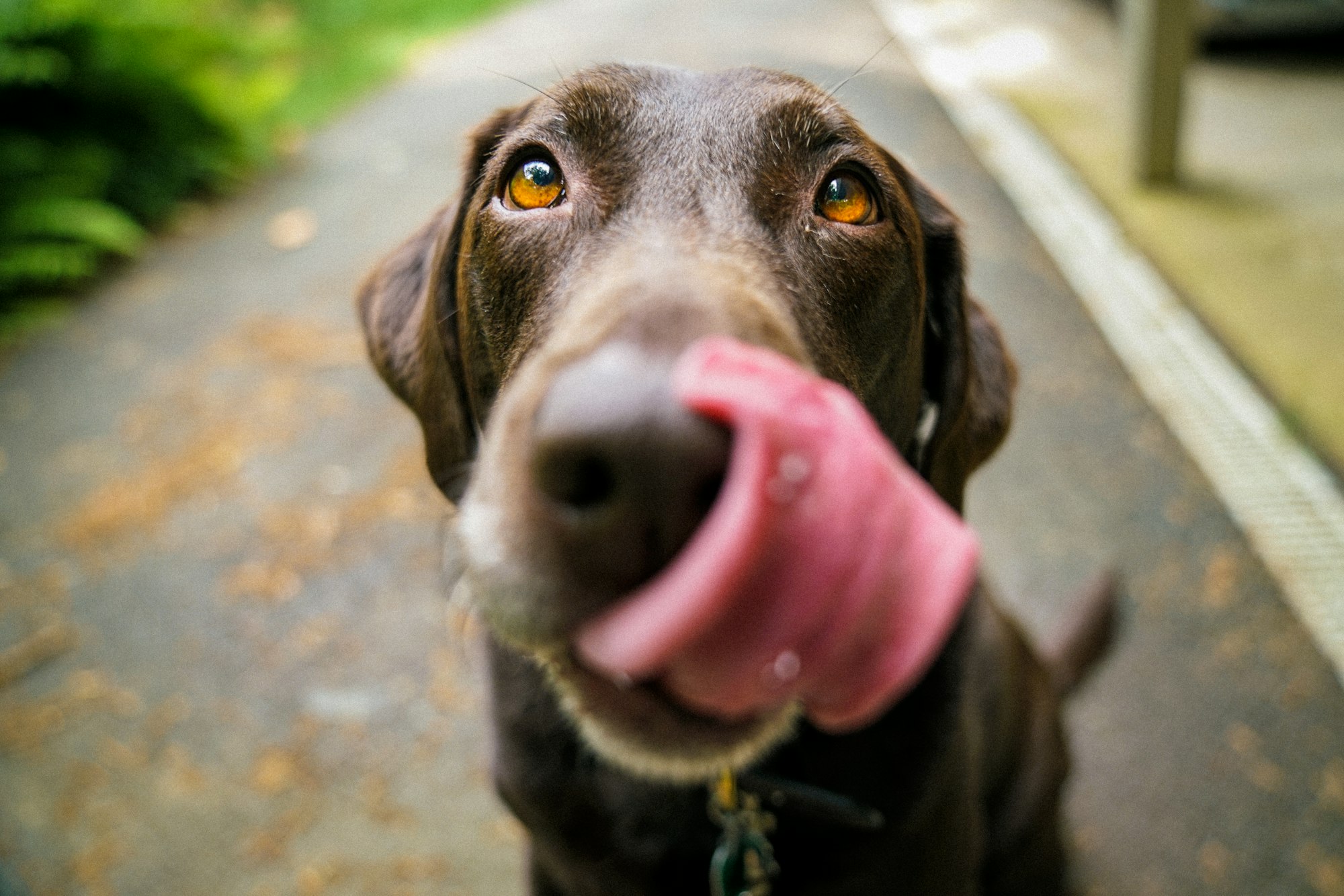As pet parents, we pay keen attention to our dog's eating habits, knowing that a sudden change can be a cause for concern. A dog refusing to eat, be it their usual dog food, a new food, or even tempting human food, can be alarming.
If your dog won't eat, whether it's their regular dry food, wet food, or a favorite treat like boiled chicken, it may indicate a problem that needs immediate attention.
This article presents a comprehensive guide to understanding canine anorexia, a disorder that often represents a dog's refusal to eat, which may involve an empty dog food bowl.
It will explore various reasons why your dog stops eating, from dental disease that could cause discomfort in your dog's mouth to issues related to their diet, such as being a picky eater or having been given too many treats.
We'll examine the considerations for young and older dogs and delve into potential remedies, like warming their canned dog food or dog's kibble with warm water or chicken broth to enhance its appeal.
Furthermore, we'll discuss how to identify other symptoms that may accompany this concerning behavior, helping you decipher when it's time to act if your dog has stopped eating.
Recognizing Signs and Symptoms of My Dog isn't Eating

Recognizing the signs and symptoms when your dog stops eating can be crucial in maintaining your pet's health. A significant shift in your dog eating habits is often the first sign that something might be off.
It can indicate an issue if your dog is not eating his usual dog food, be it dry or wet dog food, or even refusing treats or human food they usually enjoy. Your dog's food bowl remaining full or only half-eaten for a prolonged period clearly indicates a potential problem.
Symptoms can range from your dog recently becoming a picky eater, refusing certain types of food like canned food or dog's kibble, but showing interest in others like boiled chicken or cat food.
This selectivity may mean they've developed an aversion to their current dog food, or perhaps they've been given too many treats and aren't hungry for their main meals. Pack animals, like dogs, typically love to eat, and a dog refusing food could be a symptom of a more significant health issue.
Other symptoms to watch for are related to your dog's behavior and physical condition. These might include lethargy, vomiting, diarrhea, or other signs of stomach upset. Changes in your dog's weight or water consumption can also be associated with an eating disorder.
Additionally, be aware of signs of discomfort when eating, such as wincing or pawing at their mouth, which could indicate dental issues causing pain and discouraging your pet from eating.
It's also essential to consider the age of your pet. Young dogs, for instance, might refuse to dog eat due to changes in their diet or surroundings, while older dogs could have age-related health issues affecting their appetite.
In all cases, it's crucial to monitor any changes and if these symptoms persist or your dog's health seems to be deteriorating, seek advice from a veterinary professional immediately. Understanding the signs and behaviors related to eating issues is a vital step towards ensuring your pet remains healthy and happy.
What are the Common Causes of Loss of Appetite in Dogs?

A multitude of factors can cause loss of appetite in dogs.
Among the most common causes are illness or pain, stress or anxiety, dietary changes or dislike of dog food, and dental problems.
These factors can affect a dog's desire to dog eat and can lead to serious health problems if not addressed promptly.
1. Illness or pain
Sickness or discomfort can cause a decrease in appetite for dogs, leading to anorexia and potential health complications. When a dog is not eating, decreased appetite could be due to various underlying illnesses that require veterinary medicine.
For instance, stomach upset or oral pain may result in a loss of appetite for dogs. If your dog continuously dogs refuse food, booking an appointment with the vet is crucial.
In some cases, decreased appetite may be a symptom of more severe medical conditions such as kidney disease or cancer. Therefore, it's essential to monitor your furry friend's stop-eating habits closely and note any other symptoms like vomiting or lethargy.
Causes of decreased appetite in dogs:
- Illnesses such as stomach upset, oral pain
- More severe medical conditions like kidney disease or cancer
If you notice your dog stop eating despite offering its favorite meals and treats, seek professional advice from your veterinarian to prevent further complications that come with canine anorexia.
2. Stress or anxiety
Stress and anxiety can lead to a decreased appetite for dogs, which may require veterinary attention. Dogs are social animals that thrive on routine and consistency, and any change in their environment or daily life can trigger stress or anxiety.
This can manifest in various ways, including loss of appetite, lethargy, excessive licking or chewing, and avoidance behaviors.
It is important to introduce new foods while gradually maintaining a consistent feeding schedule for picky eaters who have developed an aversion to certain dog dry food or feeding methods due to stress or anxiety.
In cases of severe separation anxiety, medication, and behavior modification techniques may be necessary to reduce the dog's stress levels. Pet owners must closely monitor their pets' stop-eating habits as a lack of appetite can indicate underlying health issues beyond stress or anxiety. Consulting with a veterinarian is always advised if there are concerns about the pet's health.
3. Dietary changes or dislike of Dog food
Changes in a dog's diet or preferences towards certain foods can decrease appetite and require careful consideration from the pet owner. Dogs can be picky eaters, and even minor changes to their food can lead to them refusing to eat food altogether.
Pet owners must monitor their dogs' eating habits and ensure they get the proper nutrients they need. One reason a dog dislikes food could be due to the quality of dog food being fed. Some brands may contain ingredients that do not agree with the dog's digestive system, causing discomfort and loss of appetite.
Additionally, some dogs may prefer wet over dry food or vice versa, so trying different types of food may help stimulate their appetite. Pet owners must also avoid feeding their dogs table scraps, which can lead to weight gain and an unhealthy diet.
Understanding your dog's preferences and finding high-quality dog's food that meets their nutritional needs is crucial in maintaining their appetite and overall health.
4. Dental problems
After considering dietary changes or a dislike of dog's food as possible reasons for your dog's decreased appetite, it is important to turn attention toward dental problems. Dental disease can cause mouth pain and discomfort, leading to a reluctance to dog eat. Broken teeth can also contribute to this issue and may require veterinary attention.
Several dental issues can affect dogs and cause anorexia. These include periodontal disease, gingivitis, abscesses, and broken teeth. Symptoms of these conditions may include drooling, bad breath, bleeding gums, difficulty chewing dry kibble, or even dropping food from the mouth.
Suppose your dog has been diagnosed with any of these issues or is experiencing any symptoms related to their teeth or gums. In that case, switching them to a liquid diet may be necessary until they receive proper treatment. A liquid diet can provide adequate nutrition while minimizing pain during eating.
Potential Serious Conditions Associated with Loss of Appetite

Loss of appetite in dogs can be caused by a number of factors, including various health conditions. Some potentially serious conditions associated with loss of appetite in dogs include gastrointestinal issues, cancer, and kidney disease.
1. Health conditions that might cause loss of appetite:
Gastrointestinal issues, cancer, and kidney disease are among the health conditions that can contribute to a loss of appetite in dogs. Gastrointestinal issues may include inflammation, infection, or other digestive problems that affect the dog's ability to digest dog's food properly.
Cancer can also cause dogs to lose their appetite by causing pain and discomfort or interfering with their digestive system. Kidney disease is another serious condition that can lead to decreased appetite in dogs.
Other potential causes of anorexia in dogs include tooth decay, dental pain, and infections. Dogs may also develop dog's food allergies or intolerances which can make them reluctant to eat certain types of dog food.
Additionally, changes in a dog's eating habits may be attributed to stress or anxiety caused by environmental factors such as moving house or a change in routine. As pet owners, we need to understand the various factors that influence our dogs' appetites so we can take appropriate measures when necessary.
2. Detailed discussion on each serious condition.
Serious health conditions such as cancer and kidney disease can lead to a dog's appetite decline. When a dog stops eating, it is essential to seek veterinary care promptly. A lack of appetite could be the first symptom of an underlying condition that requires immediate attention.
Cancer is one of the most common causes of canine anorexia. Tumors can interfere with the digestive tract, making it difficult for dogs to eat and digest food properly. Similarly, kidney disease can cause dehydration and electrolyte imbalances that affect a dog's eating habits.
Other gastrointestinal issues like inflammatory bowel disease (IBD) or pancreatitis may also result in decreased appetite and weight loss in dogs. Therefore, if your dog isn't eating or their eating habits have changed suddenly, it's crucial to consult your veterinarian as soon as possible to determine the underlying cause and begin treatment promptly.
Diagnostic Procedures and Veterinarian Visits
During a veterinary visit, the veterinarian will thoroughly examine your dog to determine the underlying cause of their anorexia. This is crucial in identifying any serious conditions that may require immediate treatment.
The vet will start by taking your dog's history and asking you about their eating habits, exercise routine, and any recent changes in behavior or environment. They will then proceed to a physical exam where they will check for signs of dehydration, fever, pain, and abnormal masses.
If necessary, the veterinarian may recommend diagnostic procedures such as blood work and X-rays to help identify any underlying health issues that may be causing your dog's anorexia.
Blood tests can detect abnormalities in organ function or hormone levels while X-rays can reveal any masses or foreign objects that may obstruct the digestive tract. More advanced imaging such as ultrasound or CT scans may also be recommended in some cases.
Seeking prompt veterinary care is essential in ensuring your dog receives proper diagnosis and treatment for its condition.
Treatment Options for Loss of Appetite in Dogs
Loss of appetite in dogs can be a serious health concern. Several options are available regarding treatment, including medical treatments such as medication and surgery, and behavioral treatments like changing feeding routines and creating a stress-free environment.
And dietary changes such as trying different food types or adjusting feeding times. Each treatment option has its own benefits and drawbacks that the pet owner and veterinarian should carefully consider before making a decision.

1. Medical treatments: medication, surgery, etc.
Medical interventions such as medication or surgery may be necessary to address underlying health issues causing canine anorexia. If your dog isn't eating, it could be due to various medical conditions, including dental disease, organ failure, cancer, or infections. Your veterinarian will perform a thorough physical examination and diagnostic tests to determine the root cause of your dog's anorexia.
Once the underlying condition has been identified, your vet may recommend medication or surgical intervention to treat the issue. Some common medical treatments for canine anorexia include antibiotics for infections, chemotherapy for cancer, and pain management medications for chronic pain. In severe cases where a dog cannot eat on their own, a feeding tube may need to be inserted until it can resume normal eating habits.
It is important to work closely with your veterinarian to develop a treatment plan that addresses the underlying medical condition and any associated symptoms like loss of appetite.
2. Behavioral treatments
One potential approach to addressing canine anorexia involves implementing behavioral treatments, such as altering feeding routines and creating a stress-free environment for the dog.
A picky eater may need more frequent and smaller meals, while dogs with severe separation anxiety may benefit from calming techniques before mealtime. Changing the location or type of food bowl can also make mealtime less stressful for some dogs.
Another aspect to consider is the dog's overall environment. Stressful situations at home can affect a dog's appetite, so it is important to create a safe and calm space for them. Providing plenty of exercise and mental stimulation can also help reduce stress levels in dogs.
It is crucial to approach canine anorexia holistically by considering medical treatments and behavioral interventions to address why a dog might stop eating effectively.
3. Dietary changes
Dietary changes, such as introducing different food types or altering feeding times, may be effective in addressing canine anorexia. When a dog refuses to eat its usual meal, pet owners can try offering canned food or wet food instead of dry kibble.
Canned food and wet foods have higher moisture content and are more aromatic, which can stimulate a dog's appetite. Additionally, dogs may become tired of eating the same brand or flavor of dog food daily. Pet owners can experiment with different brands or flavors to see if their dog becomes more interested in eating.
Changing the feeding schedule may also help increase a dog's interest in food. Instead of providing meals at set times throughout the day, pet owners can try offering smaller portions multiple times throughout the day. This approach mimics how dogs would eat in the wild and may be more appealing to some dogs who prefer grazing over large meals.
It is important to note that any dietary changes should be made gradually and under the guidance of a veterinarian to ensure that they do not negatively affect a dog's health.
Preventive Measures and Regular Care
Ensuring your canine companion receives regular veterinary care is crucial in preventing anorexia. Routine check-ups can help detect any underlying health issues that may cause a loss of appetite or contribute to poor nutrition. Additionally, veterinarians can provide guidance on proper feeding and offer suggestions for dietary changes, if necessary.
Maintaining a balanced diet with essential nutrients and proper nutrition is also important for preventing anorexia in dogs. Providing high-quality dog food and avoiding table scraps or unhealthy treats can help ensure your pet gets the right amount of vitamins and minerals they need to stay healthy.
Mental health and exercise are equally critical factors in promoting overall wellness in dogs. Maintaining a stress-free environment, engaging in daily physical activity, and providing mental stimulation through interactive toys or puzzles can all help prevent anorexia by keeping dogs happy, active, and engaged.
Some additional tips for promoting good nutrition include:
- Offering smaller meals more frequently throughout the day rather than one large meal.
- Avoid sudden changes to your dog's diet as it may cause digestive upset.
- Monitoring water intake to ensure your dog stays hydrated.
- Seeking advice from your veterinarian before introducing supplements or alternative diets.
With regular vet check-ups, balanced nutrition, adequate exercise, and mindful attention to their mental well-being; we can help our furry friends maintain a healthy appetite while reducing the risk of canine anorexia.

Consequences of Prolonged Loss of Appetite
Prolonged loss of appetite in dogs can have serious consequences, affecting both their physical and mental health. When a dog stops eating, it is important to take immediate action and seek professional help.
A physical examination by a veterinarian is necessary to determine the underlying cause of the eating disorder. If left untreated, prolonged refusal to eat can lead to malnutrition, weight loss, organ failure, and other physical health problems.
In addition to its impact on physical health, continued refusal to eat can also affect a dog's mental well-being. Dogs who are not eating may become more stressed or anxious than usual. They may also lose interest in activities they once enjoyed or become less playful overall.
As such, pet owners must address any changes in their dog's appetite as soon as possible and work with their vet to develop an appropriate treatment plan that meets both their pet's nutritional needs and emotional well-being.
Tips for Encouraging Eating.
Various techniques such as enticing treats and maintaining consistent feeding times can help encourage a dog to eat.
Firstly, offering your dog high-value treats or food to entice them to eat their regular dog food is effective. Some examples of these treats include boiled chicken, cheese, or peanut butter. However, it's important not to overdo the use of treats as it may lead to obesity and other health issues.
Secondly, creating a consistent feeding schedule and routine can also help encourage eating habits in dogs. Dogs thrive on routine and structure, so feeding them at the same time every day helps establish their eating patterns. Additionally, changing up the location where they are fed may also pique their interest in their food.
When trying out these strategies for picky eaters who aren't willing to eat their dog food, it's best to consult with a veterinarian first before giving any new types of treats or adjusting feeding times drastically.
Conclusion
Understanding why your dog isn't eating is critical to responsible pet ownership. Changing your dog's eating habits can signal various potential issues, from becoming a picky eater to refusing canned food, dry food, or even their favorite boiled chicken. Whether it's a recent shift towards a new diet that your dog refuses to eat.
A stomach upset leading to a stop in eating, or a more serious condition causing a loss of appetite, monitoring these changes closely is essential. Factors such as mouth pain, an over-reliance on human food, or even issues with their regular dog food can lead to a dog not eating.
It's important to ensure your dog is still drinking water and doesn't show signs of discomfort or pain, as these could indicate more serious health issues. Veterinary medicine has a range of solutions to assist with problems related to eating, so never hesitate to seek professional advice if your dog has stopped eating. Your vigilance and quick action can significantly impact your pet's health and well-being.






